'If our daughter was screened at birth she could have been treated'
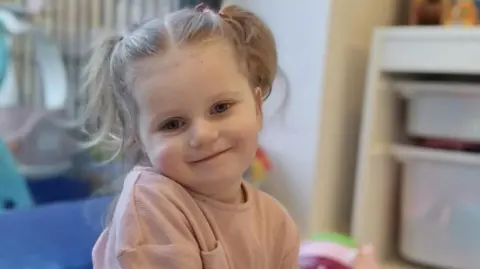 BBC
BBCImagine if there was a treatment available that could save your child's life, but as soon as you discover that they need it, it is too late to work.
That is the heart-breaking reality faced by Emily and Sean Stock, from Hertfordshire, regarding their two-year-old daughter Lily.

She has metachromatic leukodystrophy (MLD), a rare genetic disease which attacks the brain and spinal cord and is progressively robbing her of the ability to move, speak, see, swallow and eat.
It will likely lead to the loss of her life between the ages of five and eight.
In 2023, the world's most expensive drug, Libmeldy, became available on the NHS.
The £2.8m treatment is a gene therapy that can halt the progress of MLD and allow a child to go on to live a full and healthy life, but only if it is used before the child is symptomatic.
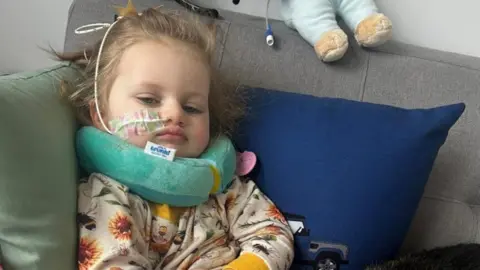 Family handout
Family handoutLily's parents are calling on the government, for the NHS and National Screening Committee to add MLD to the list of serious genetic conditions that are screened for at birth.
"The only way we could have saved Lily would have been to know she had MLD before it started to take effect", Emily says.
"If Lily had been screened at birth, we could have gone on to have treatment in six to eight weeks and prevented everything we're going through now.
"To know that is devastating - I never want another family to face this."
Libmeldy was first used in the UK in 2023 when it successfully halted the progress of MLD in Teddie.
The 19-month-old had been diagnosed and treated in time because her older sister had become symptomatic and was beyond the point of benefiting from treatment.
"At the moment, this treatment is only really helping families who are already going through the heartbreak of knowing they are going to lose one of their children anyway," Emily says.
Sean adds: "This isn't just about Lily; it's about the many more children that will come to suffer with this if something doesn't change.
"We're going to do everything we can to make sure it does change."
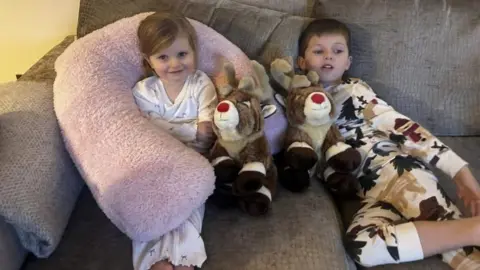 Family handout
Family handoutEmily and Sean now face an anxious wait for the result of screening on Lily's five-year-old brother Arthur.
The odds of carrying MLD are 40,000 to one. It's only if both parents carry it that MLD can be passed onto their child, with a 25% chance of that happening per pregnancy.
Emily and Sean became aware they were carriers when Lily was diagnosed.
Once the disease takes hold, an infant's regression is swift.
In July, Lily, aged 19 months, was developing as expected; she was able to sit up unsupported and was working hard to stand.
She would laugh, smirk and smile when praised for her efforts.
Eight months on, she is unable to support herself and has to be fed through a tube.
"She's a beautiful girl, she was a bright little button, she had a wicked laugh", says Emily.
Lily's first symptoms were spotted at nursery; she suffered nystagmus (an involuntary movement of the eyes), her legs were completely stiff with her toes continuously pointing and she wasn't learning to walk.
"We know there are so many more symptoms to come, that life will only get harder for Lily and that eventually MLD will take her from us far too early," says Emily.
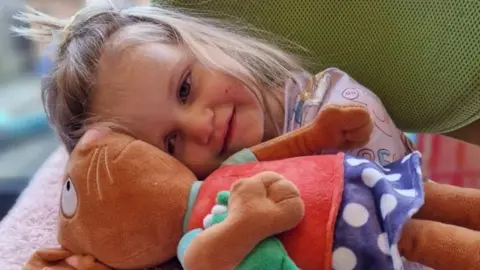 Family handout
Family handoutAlex, The Leukodystrophy Charity (Alex TLC) supports families with all forms of leukodystrophies, of which there are more than 100 types.
Karen Harrison, its director of support, says only MLD and adrenoleukodystrophy (ALD) are treatable.
"Treatment is expensive, but so is the financial cost of caring for these children for the remainder of their lives," she says.
"We're talking about young children losing their lives in horrible ways, experiencing some of the worst symptoms imaginable while they are alive."
Josh Dean, the Labour MP for Hertford and Stortford, has raised Lily's case in parliament.
"I would urge the government, the NHS and the UK National Screening Committee to seriously consider adding MLD to new-born screening", he says.
"This will do so much to reduce the chances of this happening to other young babies and children"
The National Screening Committee is in the process of reviewing the evidence for a screening programme.
In October, the government launched a study to test over 100,000 newborns for more than 200 conditions, including MLD.
The findings "will help improve testing and treatment and help predict, diagnose and treat future illnesses," the government says.
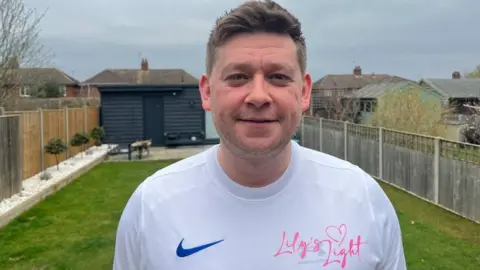
Sean's lifelong friend, David Kiddie, from Hertford, is embarking on a 190-mile fundraising walk.
Lily's Light - between the 10 southern Premier League football grounds and Wembley - aims to raise funds and awareness about the condition.
He is due to finish the challenge by facing his fear of heights and abseiling down the Tottenham Hotspur Stadium.
"Tackling my fear is nothing compared to what Lily and the family are going through", he says.
"The financial and psychological turmoil Emily, Sean and their family are facing will continue to escalate."
Sean, who is a Tottenham fan, says David's support "means the world" and strangers have been backing the family and the "whole Hertford community".
Follow Beds, Herts and Bucks news on BBC Sounds, Facebook, Instagram and X.
